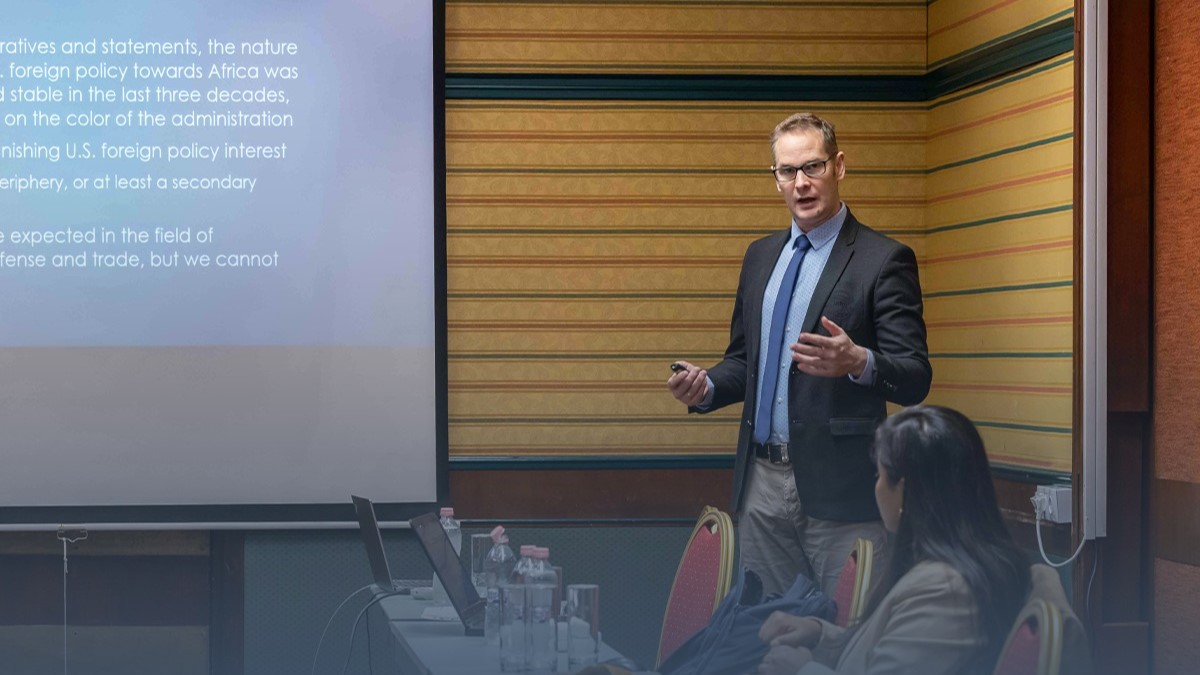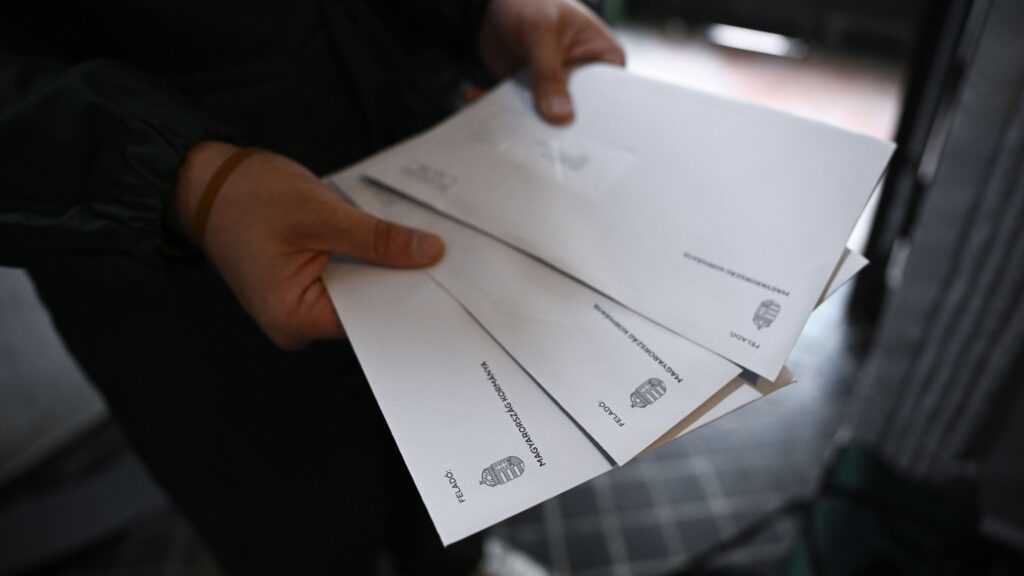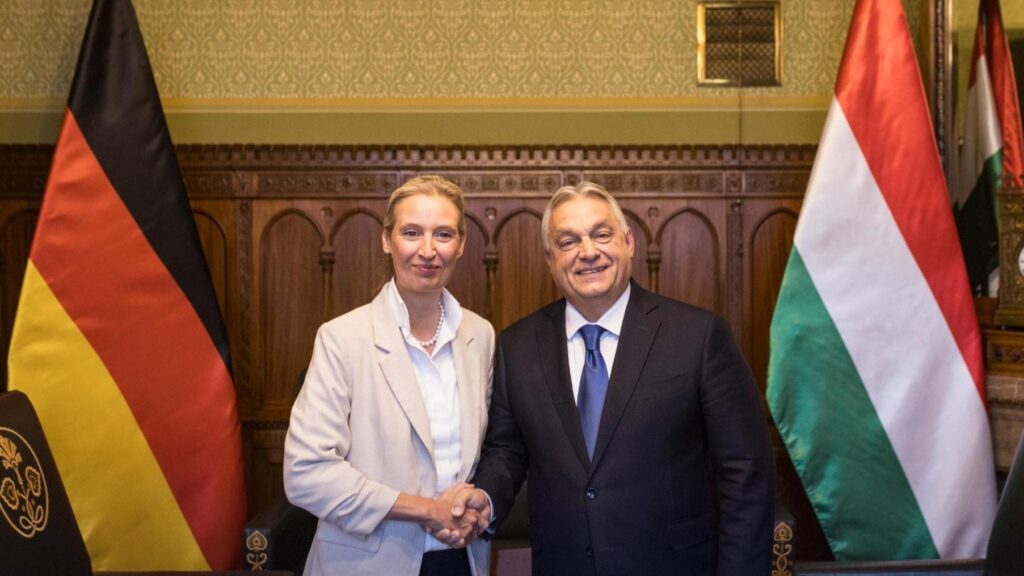On 25 March 2025 MCC Scruton in Budapest hosted Shifting Perspectives: Changing Attitudes on Migration and Security between the Global North and South. Organized by the Mathias Corvinus Collegium, the event brought together young researchers and experts to present their work on migration and security. Assistant Professor at Marwadi University Tripti Chowdhury opened the session with a lecture on human security. Executive Director of the Migration Research Institute Viktor Marsai followed with an analysis of US–Africa relations. Further presentations by PhD students Aadi Rajesh, Sathees Mohan, Rovatiana Salema Andrianasolomahefa, and Imen Khemakhem addressed regional migration dynamics and policy challenges.
Human Security and Migration in the Global South
Assistant Professor at Marwadi University Tripti Chowdhury introduced the conference by reframing migration through the concept of human security. Drawing on the UNDP’s 1994 Human Development Report, she highlighted that human security includes economic, food, health, environment, personal, community and political dimensions.
Migration, she argued, is driven not only by economic needs but also by failures across these dimensions. In India, migration from rural Bihar and Uttar Pradesh to cities like Mumbai and Chennai reveals underlying disparities. Overcrowded slums, informal labour, and lack of services create serious human security challenges.
Chowdhury also discussed regional cases. The Bangladesh–India corridor has seen large migratory flows due to climate disasters and poverty, raising contentious citizenship debates like the 2019 National Register of Citizens process in Assam. The Rohingya crisis further illustrated vulnerabilities: without formal refugee protections in India, Rohingya migrants face statelessness, exploitation, and deportation threats.

Chowdhury concluded that migration cannot be separated from broader issues of human dignity and security. She recommended stronger regional cooperation through SAARC, the expansion of labour rights, and the development of legal pathways to citizenship as essential steps to addressing future migration challenges in the Global South.
US–Africa Policy under Trump
Executive Director of the Migration Research Institute Viktor Marsai examined the trajectory of US foreign policy towards Africa, emphasizing its long-term consistency. Despite changes in administration and rhetoric, Africa has remained a secondary interest for the United States over the past 30 years.
He outlined historical stages: strategic engagement during World War II, limited Cold War involvement, post-9/11 counterterrorism operations through AFRICOM, and economic programmes like AGOA. Even Barack Obama’s presidency, despite initial expectations, did not fundamentally shift US–Africa relations.
Marsai discussed potential dynamics under a second Trump administration. He noted efforts such as the Heritage Foundation’s Project 2025 to professionalize governance, but warned: ‘Only God knows what Trump wants and how he acts.’ Marsai predicted continuity: lighter military footprints and sustained economic initiatives, but minimal strategic change.
‘Without credible alternatives from Washington, African nations would increasingly turn toward other global actors’
He stressed that without credible alternatives from Washington, African nations would increasingly turn toward other global actors. Marsai concluded that while Africa is unlikely to become a central US priority, diplomatic engagement, pragmatic trade policies, and respect for local sovereignty are necessary to maintain influence and avoid further marginalization of US interests across the continent.
Indian Migration to Central Europe
Aadi Rajesh presented an analysis of Indian migration to Central Europe, with a focus on Hungary. Early waves of migrants benefited from relaxed visa regimes and educational programmes like Stipendium Hungaricum. However, he noted that the situation has evolved: post-study employment opportunities remain limited due to Hungary’s small job market, language barriers, and strict residency requirements.
Rajesh explained that while sectors like IT and healthcare attract some Indian workers, many qualifications are not fully recognized, complicating professional integration. Moreover, Hungarian bureaucracy poses additional hurdles in visa extensions and citizenship pathways.
Despite these challenges, Hungary remains attractive to Indian students and investors seeking cost-effective education and advantageous financial conditions. For example, he noted, Hungary’s policy of no capital gains tax benefits financially stable migrants.
‘While Hungary offers potential for niche groups, it remains a difficult environment for broader Indian integration’
Rajesh concluded that while Hungary offers potential for niche groups, it remains a difficult environment for broader Indian integration without substantial reforms to labour policies, language training programmes, and degree recognition systems. Migration success, he argued, will depend on whether both Hungary and Indian migrants can adapt to new structural realities in a tightening European labour market.
Illegal Fishing and Security in South Asia
Sathees Mohan addressed the ongoing maritime conflict between India and Sri Lanka over illegal fishing in the Palk Bay region. After the 1974 Indo–Lanka Maritime Agreement, which ceded Katchatheevu Island to Sri Lanka, traditional Indian fishing access was curtailed. Nonetheless, approximately 500 Indian vessels cross daily into Sri Lankan waters, with bottom trawling practices damaging marine ecosystems and escalating diplomatic tensions.
Sri Lanka’s right to regulate its Exclusive Economic Zone under UNCLOS Articles 19 and 21 is clear, but economic disparities and limited alternatives for Tamil Nadu fishermen perpetuate the issue.
In response to a question about why Sri Lanka might engage with the Tamil Nadu state government rather than solely with New Delhi, Mohan explained that Sri Lanka recognizes the need for more direct dialogue with Tamil Nadu, given its central role in the crisis. However, Colombo remains cautious. While normalizing relations could ease tensions, Sri Lanka fears that a too-close relationship with Tamil Nadu might encourage autonomy claims among the Tamil minority in Sri Lanka’s north—a longstanding and sensitive issue.
Mohan concluded that sustainable fisheries policies, enhanced patrolling, and carefully managed diplomacy are essential to stabilizing relations and protecting maritime resources.
Migration and Challenges in Madagascar
Rovatiana Salema Andrianasolomahefa focused on migration patterns within and from Madagascar. Environmental degradation, frequent natural disasters, and persistent economic hardship have led to significant internal displacement and external emigration.
Salema identified cities like Ilakaka and Andilamena, known for sapphire mining, as major internal migration destinations. While they offer employment, rapid influxes have led to urban overcrowding, environmental destruction, and exploitation of natural resources.
Internationally, Malagasy migrants primarily head to France, Mauritius, and Gulf states, drawn by economic opportunities but facing risks of trafficking and labour exploitation. The limited access to basic services in Madagascar—only 15 per cent of the population have reliable electricity and 54 per cent have access to clean water—exacerbates the push factors.
‘Without sustained investment and structural reforms, migration pressures would only intensify’
Salema emphasized the need for urban policy reform, climate-resilient agricultural development, stronger anti-trafficking protections, and international partnerships to address Madagascar’s migration crisis. She concluded that without sustained investment and structural reforms, migration pressures would only intensify, leading to further instability and brain drain.
Migration Governance in Post-Arab Spring Tunisia
Imen Khemakhem presented the contradictions in Tunisia’s migration policies after the Arab Spring. While Tunisia ratified major human rights treaties and incorporated rights protections into its 2014 Constitution, its practical governance often undermines these commitments.
Migration remains heavily securitized: irregular migrants face imprisonment under Law 2004-6, and no comprehensive asylum framework exists. Tunisia’s cooperation with the EU through agreements like the Mobility Partnership and LEMMA Programme prioritizes border control over human rights protections.
Public attitudes toward sub-Saharan African migrants have hardened, driven by racialized narratives and media misinformation. Discrimination, racial violence, and exclusion from services are widespread.
Khemakhem argued that Tunisia’s migration governance reproduces racial hierarchies and perpetuates vulnerabilities. She called for a national asylum system, institutional reforms, and a recalibration of Tunisia’s cooperation with the EU to prioritize human dignity. Without these changes, she warned, Tunisia’s democratic consolidation would remain incomplete, exposing the gap between its international image and domestic realities.
From India to Tunisia, Madagascar to Sri Lanka, young scholars are engaging with Hungarian institutions to address global challenges. Hungary’s higher education and research communities are increasingly international—a quiet but real testament to the enduring value of Hungarian academic and cultural diplomacy.
Related articles:







